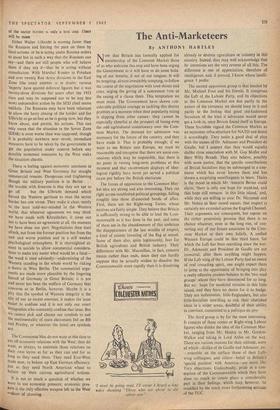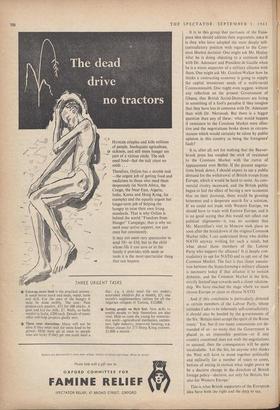The Anti-Marketeers
By ANTHONY HARTLEY
Now that Britain has formally applied for membership of the Common Market those of us who welcome this step and have been urging the Government to it will have to do some hold- ing of our breaths, if not of our tongues. It will be tempting, almost irresistibly tempting, to follow the course of the negotiation with loud shouts and cries, urging the giving of a concession here or the easing of a clause there. This temptation we must resist. The Government have shown con- siderable political courage in tackling this thorny problem at a moment when their popularity rating is slipping from other causes: they cannot be especially cheerful at the prospect of losing even the odd agricultural constituency over the Com- mon Market. The demand for admission was necessary for the future of the country, and they have made it. That is probably enough; if we want to see Britain into Europe, we must be reasonable and recognise that there are some con- cessions which may be impossible, that there is no point in raising long-term problems at this moment and that inconvenient displays of ideo- logical rigidity have never yet served a political cause put before the British electorate.
The forces of opposition to the Common Mar- ket idea are strong and also interesting. They cut right across established political groupings, falling roughly into three ill-assorted bands of allies. First, there are the Right-wing Tories, whose motives are fairly simple. They believe that Britain is sufficiently strong to be able to lead the Com- monwealth as it has done in the past, and some of them see in the abandonment of this ambition the disappearance of the last wraiths of empire, a kind of .cosmic lowering of the flag at sunset. Some of them also, quite legitimately, fear for British agriculture and British industry. Their differences with Mr. Macmillan, in fact, concern means • rather than ends, since they can hardly suppose that he actually wishes to dissolve the Commonwealth more rapidly than it is dissolving actee — COLCHESTER MI NS
'1 must he going mad, I'll swear I heard a tiny voice shouting "Those who are about to die salute you." ' already or destroy agriculture or industry in this country. Indeed, they may well acknowledge that hi- intentions are the very reverse of all this. The difference is one of appreciation, therefore of intelligence, and, if pressed, I know whose intelli- gence I prefer.
The second opposition group is that headed by Mr. Michael Foot and his friends. It comprises the Left of the Labour Party, and its objections to the Common Market are due partly to the nature of the company we should keep in it and partly to the feeling that good old-fashioned Socialism of the kind it advocates would never get a look-in, once Britain found itself in Europe. These Socialists regard the Common Market as an economic infra-structure for NATO and detest it accordingly. They make a good deal of play with the names of Dr. Adenauer and President de Gaulle, but I suspect that they would equally dislike close association with M. Guy Mollet and Herr Willy Brandt. They also believe, possibly with some justice, that the specific contributions of British Socialism may be submerged in a con- tinent which has never known them and has shown a surprising unwillingness to learn. Theirs is the mood in which Mr. Aneurin Bevan could claim, 'there is only one hope for mankind, and that hope still remains in this little island,' and, while they are willing to treat Dr. Nkrumah and Mr. Nehru as their moral equals, that respect is certainly not extended across the English Channel. Their arguments are consequent, but repose on the rather pessimistic premise that there is no chance whatever, even in the long run, of con- verting any of our future associates in the Com- mon Market to their own beliefs. A unified Western Europe could be that third force, for which the Left has been searching since the war. Dr. Adenauer and President de Gaulle are not immortal; after them anything might happen. If the Left wing of the Labour Party had an ounce of real crusading spirit, one might expect them to jump at the opportunity of bringing into play a really effective counter-balance to the 'two mad groups' whom they have denounced for so long. But no: hope for mankind remains in this little island, and they have no desire for it to budge. They are isolationists, little-Englanders, but also little-Socialists unwilling to risk their cherished ideas in a wider arena, doubtful of their ability to convince, committed to a politique du pine.
The third group is by far the most interesting. It consists of those centre or Right-wing Labour figureS who dislike the idea of the Common Mar- ket, ranging from Mr. Healey to Mr. Gordon- Walker and taking in Lord Attlee on the way. There are various reasons for their attitude, some of which—dislike of de Gaulle and Adenauer, etc. —resemble on the surface those of their Left- wing colleagues, and others—belief in Britain's 'special position' with America—arc more like Tory objections. Undoubtedly, pride in a con- ception of the Commonwealth which they have done so much to create plays a considerable part in their feelings, which may, however, be modified by the much more forthcoming attitude of the TUC.
It is to this group that partisans of the Euro- pean idea should address their arguments, since it is they who have adopted the most deeply self- contradictory position with regard to the Com- mon Market decision. One might ask Mr. Healey what he is doing objecting to a common tariff with Dr. Adenauer and President de Gaulle when he is a warm supporter of a military alliance with them. One might ask Mr. Gordon-Walker how he thinks a contracting economy is going to supply the capital investment needs of a multi-racial Commonwealth. One might even suggest. without any reflection on the present Government of Ghana, that British Social-Democrats are living in something of a fool's paradise if they imagine that they have less in common with Dr. Adenauer than with Dr. Nkrumah. But there is a bigger question than any of these: what would happen if resistance to the Common Market were effec- tive and the negotiations broke down in circum- stances which would certainly be taken by public opinion in this country as being the foreigners' fault?
It is, after all, not for nothing that the Beaver- brook press has coupled the stick of resistance to the Common Market with the carrot of appeasement over Berlin. If the present negotia- tions break down, I should expect to see a public demand for the withdrawal of British troops from Europe, which it would be hard to resist. As com- mercial rivalry increased, and the British public began to feel the effect of having a new economic bloc on their doorstep, there would be growing bitterness and a desperate search for a solution. If we could not trade with Western Europe, we should have to trade with Eastern Europe, and it is no good saying that this would not affect our political alignments—it was no accident that Mr. Macmillan's visit to Moscow took place so soon after the breakdown of the original Common Market talks. I can understand those who dislike NATO anyway wishing for such a result, but what about those members of the Labour Party who support the alliance? It is deeply con- tradictory to opt for NATO and to opt out of the Common Market. The fact is that closer associa- tion between the States forming a military alliance is necessary today if that alliance- is to remain dynamic, and the Common Market is the first, strictly limited-step towards such a closer relation- ship. We have reached the stage where we must choose Europe or cease to choose NATO.
And if this conclusion is particularly directed at certain members of the Labour Party, whose it should also be heeded by the governments of the Six. 'Britain must accept the spirit of the Rome treaty.' Yes, but if too many concessions are de- manded of us—so many that the Government is placed in. an impossible position—or if any country concerned does not wish the negotiations to succeed, then the consequences will be quite incalculable. 'Let the Six, let anyone who thinks the West will have to stand together politically and militarily for a number of years to come, beware of setting in motion what might prove to be a decisive change in the direction of British foreign policy—decisive, not only for Britain, but also for Western Europe.'
This is what British supporters of the European , idea have both the right and the duty to say.



































 Previous page
Previous page